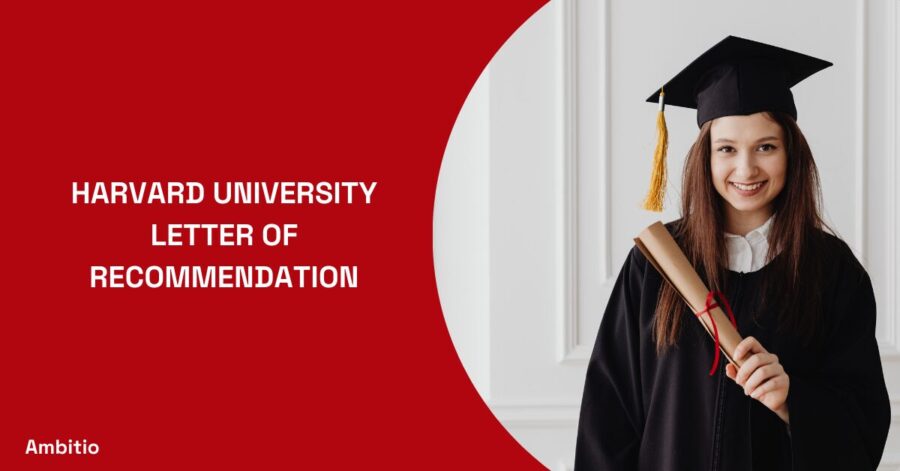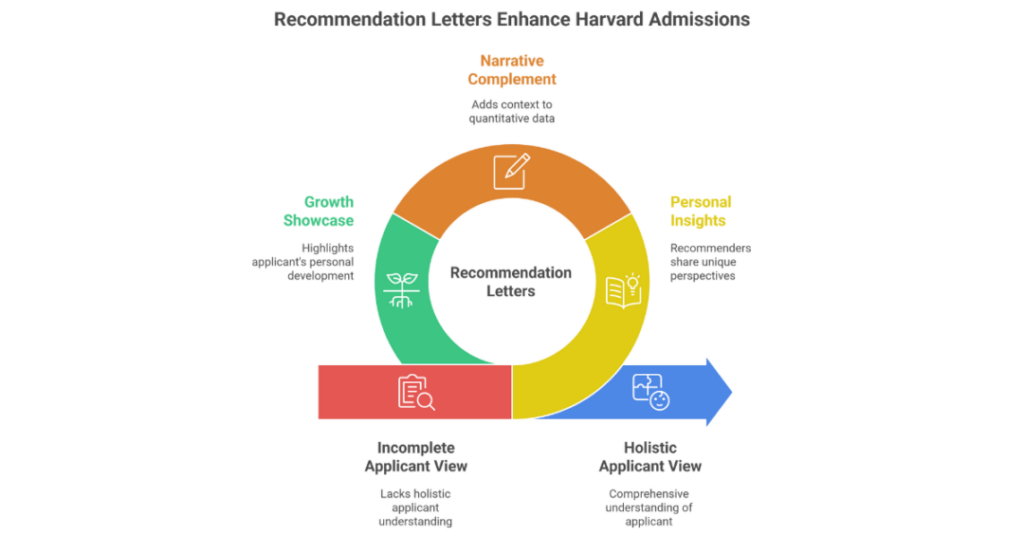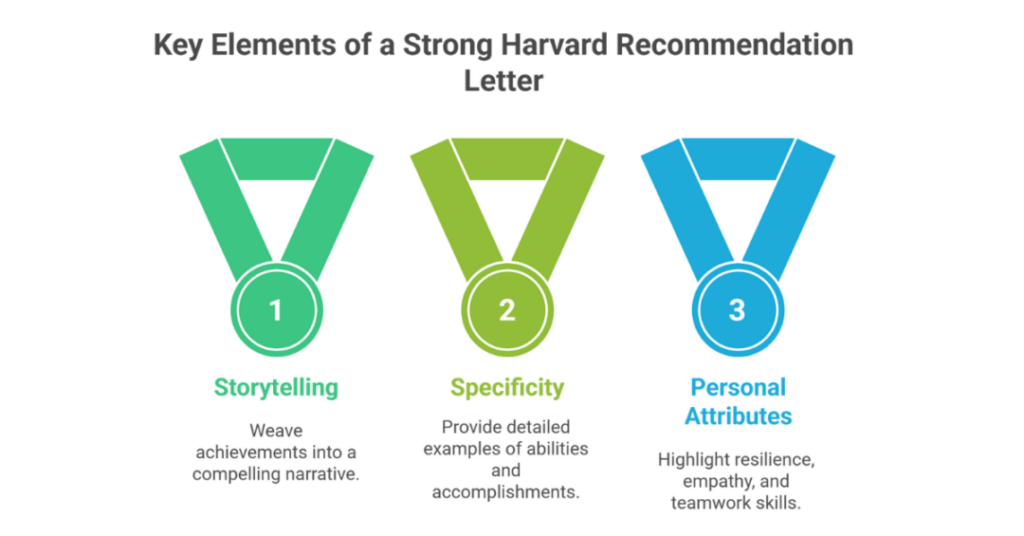16 August 2025
7 minutes read
Harvard University Letter of Recommendation: A Guide for Indian Students

Key Takeaways
- Harvard University letter of recommendation plays a crucial role in admissions, highlighting qualities beyond grades like leadership, growth, and curiosity.
- Picking the right teachers or counselors who know you well ensures specific, authentic stories that admission officers value.
- Quality over quantity; well-written, timely letters add real weight to your Harvard application.
Applying to Harvard is tough. Admission officers review thousands of students and hundreds of letters of recommendation for college, searching for what sets you apart. A Harvard University letter of recommendation that feels generic, rushed, or written by the wrong letter writers can hurt your application to Harvard.
Officers look for in Harvard recommendation letters specific examples of coursework, academic accomplishments, and leadership potential, both inside and outside the classroom, written by teachers and counselors who know you well and support your application.
The Role of Recommendation Letters in Harvard Admission
At Harvard University, the letter of recommendation is more than a formality; it’s a crucial component of the admissions process. It allows admission officers to gain a holistic view of the applicant, extending beyond mere academic prowess and test scores.

Through these letters, recommenders have the unique opportunity to provide personal insights into the applicant’s character, accomplishments, and potential for future growth.
More Than Grades and Scores
In the context of Harvard admissions, a letter of recommendation serves as a narrative that complements the quantitative aspects of an application, like GPA and SAT/ACT scores. It’s an endorsement of the student’s suitability for the challenging environment that Harvard offers.
Effective recommendation letters often highlight characteristics like intellectual curiosity, resilience, empathy, and leadership. These qualities are what Harvard looks for in its future students, aspiring for them to not only excel academically but also contribute positively to their community and society at large.
Insight into Personal Growth
Harvard places great emphasis on the personal growth and potential of its applicants. A well-written letter of recommendation for indian students can showcase this aspect brilliantly.
For example, a teacher can describe how an applicant overcame academic challenges, showing determination and a willingness to grow. Such stories resonate with admission officers, giving them a glimpse into the applicant’s character and potential for future development.
Choosing the Right Recommenders
Selecting the right individuals who should write your recommendation letters is a strategic and crucial step in the Harvard application process. Ideally, these should be individuals who have had a significant and positive interaction with you and can vouch for both your academic and personal qualities. This could include teachers, counselors, mentors, or even employers.
Building Relationships with Potential Recommenders
It’s important to have built strong, positive relationships with potential recommenders. Harvard looks for authentic insights into your character and capabilities.
The more a recommender knows you, the more personalized and impactful their letter can be. It’s beneficial to interact with potential recommenders well in advance, ensuring they have a comprehensive understanding of your academic achievements, personal strengths, and future aspirations.
Diversity in Recommendations
While most applicants choose their teachers for academic letter of recommendations, including a letter from someone outside the academic sphere, like a coach, employer, or community leader, can provide a well-rounded view of your capabilities.
This diversity in perspective can be particularly appealing to Harvard’s admissions committee, showcasing various facets of your personality and achievements.
Crafting a Strong Harvard Recommendation Letter
A recommendation letter for Harvard is not just a formal document but a personal testimony to your academic prowess, character, and potential. It’s an essential part of your application, providing a third-person perspective on your achievements and capabilities.

Here’s a detailed look at how to craft a strong recommendation letter that stands out to the Harvard admissions committee.
Understanding What Harvard Looks For
Before you begin writing a recommendation letter for Harvard, it’s crucial to understand what the university values in its students. Harvard looks for individuals who exhibit exceptional intellectual abilities, leadership qualities, a commitment to their communities, and the potential to make a significant impact in their field of study. A strong recommendation letter should reflect these traits, presenting the candidate as a well-rounded, ambitious, and capable individual.
The Art of Storytelling in Recommendation Letters
A key element of a powerful recommendation letter is its ability to tell a compelling story about the candidate. It should not merely list achievements and qualities but should weave them into a narrative that demonstrates the student’s journey, growth, and potential.
For instance, a teacher can recount how the student tackled a particularly challenging project, showing their problem-solving skills, perseverance, and ability to work under pressure. This storytelling approach makes the letter engaging and memorable, leaving a lasting impression on the admissions committee.
Highlighting Academic and Personal Achievements
Academic prowess is a given for any Harvard applicant, but a recommendation letter should also shed light on personal achievements and characteristics. This might include leadership roles in extracurricular activities, involvement in community service, or unique personal accomplishments. These insights help the admissions committee see the candidate as more than just grades and test scores of GRE/GMAT, illustrating their capacity for real-world impact.
Specific Examples and Detailed Descriptions
Vague praises and generic statements do little to sway the admissions committee. A strong letter should include specific examples and detailed descriptions of the student’s abilities and accomplishments.
For example, rather than saying the student is a good leader, the letter could describe a particular event where the student demonstrated leadership. This specificity adds authenticity and credibility to the recommendation.
Showcasing Intellectual Curiosity and Passion
Harvard is renowned for its rigorous academic environment, and it seeks students who are genuinely passionate about learning. A recommendation letter should showcase the student’s intellectual curiosity and eagerness to explore their field of interest. Mentions of their participation in advanced courses, research projects, or relevant extracurriculars can underscore their commitment to academic excellence.
Personal Attributes and Soft Skills
Harvard values students who are not only academically gifted but also possess strong personal attributes and soft skills. The recommendation letter should touch upon qualities like resilience, empathy, teamwork, and communication skills. These traits are essential for success in a diverse and challenging academic environment and indicate the student’s readiness for the demands of Harvard.
Avoiding Common Pitfalls
While focusing on the positives, it’s also important to avoid common pitfalls in recommendation letters. Overstatements, lack of specificity, and clichés can diminish the letter’s effectiveness.
The tone should be balanced, providing an honest and realistic portrayal of the student. It’s also crucial to steer clear of comparisons with other students, as the focus should solely be on the candidate’s own merits.
Balance Between Professionalism and Personal Touch
A recommendation letter should maintain a balance between professionalism and a personal touch. While it needs to be formal and well-structured, it should also reflect a personal connection with the student. This balance ensures that the letter is both respectful and warm, providing a nuanced view of the candidate’s capabilities and character.
Final Thoughts and Strong Endorsement
Concluding the letter with a strong endorsement and a summary of the student’s qualifications and potential is essential. This final thought should leave no doubt in the admissions committee’s mind about the student’s suitability for Harvard. It’s a chance to reiterate the student’s unique qualities and the value they would bring to the Harvard community.
Harvard Recommendation Letter Sample Insights
Analyzing sample recommendation letters that have successfully contributed to Harvard admissions can provide valuable insights.
These samples often illustrate how to balance personal anecdotes with professional evaluations effectively.
Decoding Successful Harvard LORs
Successful Harvard recommendation letters often have a few things in common: they are well-structured, articulate, and provide a clear narrative about the student’s strengths and potential.
Examining such letters can help understand the tone, style, and type of content that resonates with Harvard’s admissions committee. For instance, letters that tell a compelling story about the student’s journey, challenges, achievements, and aspirations tend to stand out.
Tailoring Your Letter to Reflect Harvard’s Values
Harvard values diversity, intellectual curiosity, leadership, and a commitment to making a positive impact. Tailoring the recommendation letter to reflect these values can significantly enhance its effectiveness.
For example, highlighting instances where the student has demonstrated these qualities can align the letter more closely with what Harvard seeks in its candidates.
The Process of Submitting Your Harvard Recommendation Letters
Understanding and adhering to Harvard’s guidelines for submitting recommendation letters is crucial. The process typically involves submitting letters through the Common Application or Coalition Application platforms, and it’s important to be aware of the specific deadlines.
Navigating the Submission Process
The submission process for Harvard recommendation letters is predominantly online, through the Common Application or Coalition Application platforms. It’s important for both the applicant and the recommender to understand how these platforms work.
The applicant needs to request the recommendation through the platform, and the recommender will receive an email with instructions on how to submit the letter. Being aware of Harvard’s submission deadlines and ensuring that the recommenders are too, is critical.
Handling Technicalities and Challenges
Occasionally, technical issues can arise during the submission process, such as login problems or uploading errors. It’s advisable to complete the submission process well ahead of the deadline to account for any unforeseen challenges. If issues persist, contacting the admissions office for guidance is a recommended step.
Additional Letters of Recommendation
While Harvard requires two letters of recommendation, applicants have the option to submit additional letters if they believe these will provide new and valuable perspectives to their application.
Deciding on Additional Recommenders
The decision to submit additional letters of recommendation should be made judiciously. These letters should offer new insights or perspectives on the applicant that the required letters do not cover. For instance, an additional letter from a mentor in a significant extracurricular activity can shed light on aspects of the student’s personality and abilities that academic recommenders might not be privy to.
Quality Over Quantity
It’s important to remember that more is not always better. Harvard admissions officers have a vast number of applications to review, so additional letters should be impactful and necessary. The focus should be on quality and relevance, ensuring that each letter adds a unique dimension to the application.
Conclusion
A well-crafted letter of recommendation is a vital component of your Harvard University application. It’s a testament to your abilities and character, providing the admission committee with a deeper understanding of who you are beyond your academic scores.
By choosing the right recommenders, ensuring that your letters are well-written and authentic, and adhering to submission guidelines, you can enhance your chances of standing out in a pool of highly competitive applicants.
Struggling with your Harvard University letter of recommendation? Let Ambitio guide you with expert tips, personalized strategies, and samples crafted for Indian students. Get started today and make your application stand out!
FAQs
How many recommendation letters does Harvard require?
Harvard typically requires two letters of recommendation, usually from teachers.
Can I submit more than two recommendation letters to Harvard?
Yes, but it’s important that these additional letters provide new insights or perspectives.
Should the recommendation letters be from teachers of specific subjects?
It’s advisable to have letters from teachers in different core academic areas, showing a breadth of skills and knowledge.
How important are recommendation letters in the Harvard admission process
They are very important as they provide a comprehensive view of the applicant beyond grades and test scores.
Can I use the same recommendation letter for different colleges?
Yes, but it’s crucial that each letter is tailored to reflect how you fit with each specific college’s values and offerings.

You can study at top universities worldwide!
Get expert tips and tricks to get into top universities with a free expert session.
Book Your Free 30-Minute Session Now! Book a call now




























